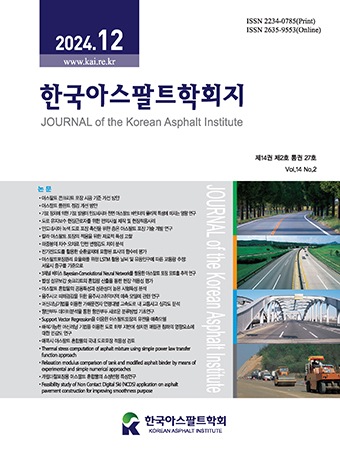Publishing Policies
Research Ethics Code
2011.03.31 enacted
2020.05.21 revision
Chapter 1 General Provisions
Article 1 [Purpose)
This regulation governs all matters such as standards for research misconduct, disciplinary action, etc. for papers submitted and published in the journal of the Korean Asphalt Society (hereinafter referred to as “the Society”) and research results commissioned by the Society. The purpose of this study is to establish the research ethics and truthfulness of the society and to suggest directions.
Article 2 (Research Ethics Committee)
1) A Research Ethics Committee (hereinafter referred to as the “Committee”) is established within the Society to deliberate and decide on matters stipulated in this regulation.
2) The chairperson of the committee shall be the vice president in charge of academic affairs, and the chairperson convenes and presides over the committee. However, in the case of a committee that does not include a vice president in charge of academic affairs, the chairperson is elected by election among the members.
3) The committee is appointed by the president of the society with no more than 10 members including the vice president in charge of academic affairs, the academic director, and the editorial chair of the thesis. However, the author and research director of the thesis subject to the deliberation agenda cannot become members.
4) The committee may temporarily appoint related external experts depending on the case for fairness of deliberation and resolution.
Chapter 2 Research Misconduct
Article 3 (Objects of Research Misconduct)
Research misconduct applies to papers submitted and published in academic journals and journals. The research results performed by the research service commissioned by the society are also applied in accordance with the thesis.
Article 4 (Forgery and Forgery)
Forgery or falsification includes intentionally expressing data used in research, figures, figures, etc., different from the truth, as follows.
1) Forgery refers to the act of creating and recording or reporting non-existent data or research results.
2) Falsification refers to the act of distorting research contents or results by artificially manipulating the research process, etc. or by arbitrarily modifying or deleting data.
Article 5 (Plagiarism)
1) Plagiarism intentionally includes academic ideas, opinions, expressions, research results, etc. already published through all written media such as domestic and foreign academic journals, academic conference papers, research reports, master's and doctoral dissertations, books, magazines, and the Internet. It refers to the act of describing the contents of
2) However, it will not be judged as plagiarism, even if it is written without citation about academic knowledge or research results that are already common and used in academia.
Article 6 (Simultaneous Submission)
Submitted papers cannot be submitted to other journals registered with the Academic Promotion Foundation in Korea, candidates for registration, or duplicate submissions at the same time or after succession.
Article 7 (Duplicate publication)
1) ① Papers that have been published in journals registered with the Korea Academic Promotion Foundation, candidates for registration, or foreign academic journals cannot be duplicated.
② Whether or not it differs from existing papers is judged based on the following criteria.
go. There must be a significant difference from the existing papers in at least two items in the items such as the purpose, method, scope, data, results, and logic development method of the research.
me. Differences in language used are not recognized as discrimination.
2) Papers published in academic journals that are not registered or candidates for registration by the Academic Promotion Foundation, such as school journals, can be submitted and published only if they have been revised or supplemented.
3) When submitting a paper presented at an academic conference or a part thereof as it is, or with corrections or supplements, the fact must be stated.
4) In the case of submitting a research report or a part thereof as it is or with modifications or supplements, the fact must be specified.
5) When submitting a doctoral or master's thesis or a part thereof as it is, or with modifications or supplements, the author of the thesis must be included in the author list.
Chapter 3 Deliberation and Decision Procedure
Article 8 (Determination of Research Misconduct)
1) If there is a report on research misconduct inside or outside the society, including members of the society, the editorial committee must collect the relevant data and confirm the reliability of the report.
2) When the chairman of the editorial committee confirms the credibility of the report, he presents it to the committee as an agenda and submits the material for deliberation.
3) The committee chair gives the researcher an opportunity to explain in writing about the proposed agenda prior to deliberation.
4) The Research Ethics Committee decides whether there is research misconduct with the attendance of 2/3 of the members and the consent of 2/3 of the members present, and deliberates and decides on the period of prohibition of thesis submission.
5) The president of the society notifies the researcher of the decision of the research ethics committee and the reason.
Article 9 (Objection)
1) A researcher who has been judged to be a research misconduct may raise an objection in writing only once within one month from the date of notification if the committee's decision or the reason is judged to be unreasonable.
2) The committee may review the validity of the objection and reconfirm or amend the content of the resolution.
3) The president notifies the relevant researcher of the committee's decision and the reason.
Article 10 (Confidentiality)
1) The identity of the person who reported the research misconduct must not be disclosed to the outside.
2) The identity of the researcher must not be disclosed to the outside before it is finally determined as research misconduct or when it is determined that it is not research misconduct.
Chapter 4 Result Handling
Article 11 (Processing of Results)
If the committee determines that it is forgery, falsification, plagiarism, or duplicate publication, the committee sends the results of the investigation to the steering committee.
Article 12 (Others)
Matters not stipulated in this regulation are subject to the respect of the board of directors or related laws.
addendum
Article 1 (Opening and closing of regulations)
This regulation may be opened or closed by the resolution of the board of directors.
Article 2 (Enforcement Date)
This regulation takes effect from the date of revision.
Article 3 (Enactment and Revision Date)
Enacted on March 31, 2011
Revised on May 21, 2020
연구윤리규정
2011.03.31 제 정
2020.05.21 개 정
제1장 총 칙
제1조 (목적)
본 규정은 사단법인 한국아스팔트학회(이하 “학회”)의 논문집, 학회지에 투고, 게재되는 논문과 학회에 의뢰되는 연구용역에 의해 수행되는 연구결과물에 대한 연구부정행위의 기준, 징계 등의 제반 사항을 정함으로써 학회의 연구윤리 및 진실성을 정립과 방향을 제시하는 것을 목적으로 한다.
제2조 (연구윤리위원회)
1) 본 규정에 정한 사항을 심의, 의결하기 위해 학회 내에 연구윤리위원회(이하 위원회)를 둔다.
2) 위원회의 위원장은 학회 학술담당 부회장으로 하며, 위원장은 위원회를 소집, 주재한다. 단, 학술담당 부회장이 포함되지 않은 위원회의 구성 시는 위원간 호선으로 위원장을 선출한다.
3) 위원회는 학회 학술담당 부회장, 학술담당이사, 논문집 편집위원장을 포함하여 10인 이내의 위원으로 학회 회장이 위촉한다. 단, 심의 안건의 대상이 되는 논문의 저자 및 연구책임자는 위원이 될 수 없다.
4) 위원회는 심의, 의결의 공정성을 위해 사안에 따라 관련 외부전문가를 한시적으로 위촉할 수 있다.
제2장 연구부정행위
제3조 (연구부정행위의 대상)
연구부정행위는 학회의 논문집과 학회지에 투고 및 게재되는 논문을 대상으로 한다. 학회에 의뢰되는 연구용역에 의해 수행되는 연구결과물에 대해서도 논문에 준하여 적용한다.
제4조 (위조ㆍ변조)
위조나 변조는 다음과 같이 연구에 사용된 자료, 결과물의 수치, 그림 등을 의도적으로 진실과 다르게 표현하는 행위를 포괄한다.
1) 위조는 존재하지 않는 자료나 연구결과 등을 만들어 내고 이를 기록하거나 보고하는 행위를 말한다.
2) 변조는 연구 과정 등을 인위적으로 조작하거나 데이터를 임의로 변형ㆍ삭제함으로써 연구 내용 또는 결과를 왜곡하는 행위를 말한다.
제5조 (표절)
1) 표절은 고의적으로 국ㆍ내외 학술지, 학술대회 발표논문, 연구보고서, 석ㆍ박사학위논문, 서적, 잡지, 인터넷 등 모든 문자화된 매체를 통해 이미 발표된 학문적 아이디어, 견해, 표현, 연구결과 등의 내용을 출처표기 없이 기술하는 행위를 말한다.
2) 다만, 학계에서 이미 보편화되어 통용되고 있는 학문적 지식이나 연구결과 등에 대해서는 이를 인용 없이 기술하는 경우라도 표절로 판단하지 않는다.
제6조 (동시 투고)
투고 논문은 국내 다른 학술진흥재단 등재지, 등재후보지나 국외 학술지에 동시에 또는 선후에 관계없이 중복 투고할 수 없다.
제7조 (중복 게재)
1) ① 국내 학술진흥재단 등재지, 등재후보지 또는 국외 학술지에 게재되었던 논문은 중복 게재 할 수 없다.
② 기존 논문과의 차별성 여부는 다음의 기준에 의거하여 판단한다.
가. 연구의 목적, 방법, 범위, 자료, 결과, 논리전개방식 등의 항목에 있어 최소한 2개 이상의 항목에서 기존 논문과 현저한 차이가 있어야 한다.
나. 사용 언어의 차이는 차별성으로 인정하지 않는다.
2) 교내학술지 등 학술진흥재단 등재지나 등재후보지가 아닌 학술지에 게재된 논문은 수정ㆍ보완된 경우에 한하여 투고 및 게재할 수 있으며 수정 보완 여부는 제7조 1) ②에 의거하여 판단한다.
3) 학술대회 등에서 발표된 논문이나 그 일부를 그대로 또는 수정ㆍ보완하여 투고하는 경우에는 그 사실을 명기하여야 한다.
4) 연구보고서나 그 일부를 그대로 또는 수정ㆍ보완하여 투고하는 경우에는 그 사실을 명기하여야 한다.
5) 박사 또는 석사 학위논문이나 그 일부를 그대로 또는 수정ㆍ보완하여 투고하는 경우에는 반드시 학위논문의 작성자가 저자에 포함되어야 한다.
제3장 심의 및 의결 절차
제8조 (연구부정행위 판정)
1) 학회 회원을 비롯하여 학회 내ㆍ외에서 연구부정행위에 대한 제보가 있으면, 해당 편집위원회는 관련 자료를 취합하여 제보의 신뢰성을 확인하여야 한다.
2) 해당 편집위원회 위원장은 제보의 신뢰성을 확인하면, 이를 위원회에 안건으로 상정하고 심의 자료를 제출한다.
3) 위원회 위원장은 심의에 앞서 상정된 안건에 대해 사전에 해당 연구자에게 문서로 소명할 기회를 부여한다.
4) 연구윤리위원회는 위원 2/3 출석, 출석 위원 2/3의 표결 동의로 연구 부정행위 여부를 판정하고, 논문투고금지 기간을 심의, 의결한다.
5) 학회 회장은 연구윤리위원회의 의결 내용과 그 사유를 해당 연구자에게 통보한다.
제9조 (이의제기)
1) 연구부정행위로 판정된 연구자는 위원회의 의결 내용이나 그 사유가 부당하다고 판단하는 경우, 통보일로부터 1개월 이내에 1회에 한하여 문서로 이의를 제기할 수 있다.
2) 위원회는 이의제기의 타당성을 심의하여 의결 내용을 재확인 또는 수정할 수 있다.
3) 회장은 위원회의 의결 내용과 그 사유를 해당 연구자에게 통보한다.
제10조 (비밀보장)
1) 연구부정행위를 제보한 자의 신원을 외부에 공개해서는 안 된다.
2) 연구부정행위로 최종 판정되기 전이나 연구부정행위가 아닌 것으로 판정되는 경우 해당연구자의 신원을 외부에 공개해서는 안 된다.
제4장 결과 처리
제11조 (결과 처리)
위원회가 위조, 변조, 표절, 중복 게재로 판정한 경우, 위원회는 조사결과를 운영위원회에 송부한다.
제12조 (기타)
본 규정에서 정하지 않은 사항은 이사회의 경의 또는 관계법령에 따른다.
부칙
제1조 (규정의 개폐)
본 규정은 이사회의 의결로 개폐할 수 있다.
제2조 (시행일)
본 규정은 개정된 날부터 시행한다.
제3조 (제정 및 개정일)
2011년 03월 31일 제정
2020년 05월 21일 개정


 Journal of the Korean Asphalt Institute
Journal of the Korean Asphalt Institute






